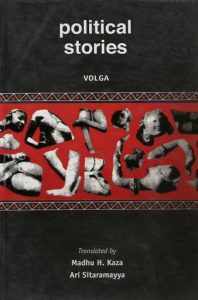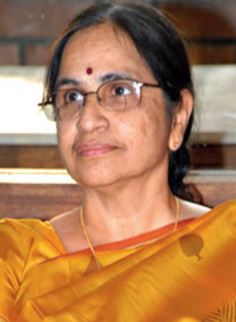Political Stories by Volga

Author’s Foreword- Part-2
It is necessary for us to recognize today that the same relationship that exists between our hands and our brain in carrying out a task, exists between the body and mind. We should stress that our mind is not separate from our body. Women rarely realize that they have responsibilities for themselves or for society. They generally think that their responsibilities only towards their family, their husbands and children. Take for example a woman dressing up and wearing flowers in her hair and looking happy and pretty (again a myth perpetuated by society – I am just using this as an example), the legend around this is that she should not do this for herself but to please her husband; if she does not have a husband dressing up becomes undesirable. It is the same with cook ing. Women cook and eat. But if a woman is alone, she would think that there is no point in making an elaborate meal because there is ‘nobody’ to eat; so she would make do with some chutney. Evidently, a woman does not think that she should eat and remain healthy for her own sake and the sake of society, no, it is always for the good of the husband and children. These are simple examples everybody can recognize. There are other, more complex and sophisticated controls woven very strongly around us, that look very natural and make us believe that any thought of opposing them would be sinful. We ourselves reproach other women for breaking free of these controls, and our society, of course, does not even hesitate in condemning as criminal any opposition to these controls.
If a woman likes a hearty meal, the stamp on her would be that she doesn’t worry about her husband and children. “MundugA thinnamma mogudAkalerugadu (a woman who eats first does not understand the husband’s hunger)”, “kadupE kailAsam; illE vaikuntham (she lives for her stomach)” are some of our proverbs. The accusations leveled against a woman who dresses up when her husband is not around
need not be rehearsed here.
These are things that are not too difficult to recognize and think about. But we are conditioned right from childhood not to think of such “trivial” things. We are used to accepting the dictates of how our bodies should and shouldn’t look, and what we should and shouldn’t do with our bodies. We are trained to despise the very nature of our bodies. We are trained to worry about escaping what we have come to believe as the wretchedness of our bodies. We accept the physiological functions of a woman’s body as being the consequences of her sinful nature, and, therefore, the atrocities committed on her body are her own fault. Even the educated and “scholarly” claim that if women wear proper clothes, do not appear provocative, walk with their heads bowed, don’t laugh so much, then, the sexual harassment of women would not occur. Becoming aware of these things and beginning to respect our own bodies is synonymous with working for profound changes in the attitude of our society. It is as necessary to fight against the societal myths built around women’s bodies as it is to think about power relationships built on the basis of class, caste and gender.
In writing these stories I tried to define what we are doing now with our bodies and how our relationships with others and society are shaped by what we think of our bodies. We need thousands of stories like this. I hope these stories will be useful in understanding how we have been molded as “women” in today’s society, and how our societal roles are defined
In this anthology, some stories such as “Walls”, “Security”, “What Shall I do” deal with the misconceptions women live with and how breaking through them could lead to happier lives. One of the main strategies of this society with respect to women is to divide and rule. A girl may have certain definitive ideas about a mother-in-law even before marriage. Mother-in-law, sister-in-law, co-daughter-in-law – all have stereotyped images. Two women might step into adversarial roles even before being acquainted with each other, remaining oblivious to their shared experience as women. That is how badly society has managed to divide women. One of the biggest myths propagated by our society is that marriage provides security to a woman; that without a husband, there is no security. The fact that insecurity derives from the relationship with a man is made completely obscure. In the name of love, affection, responsibility and such, women are forced to do things that are detrimental to their own selfrespect. According to our society’s propaganda, marriage and motherhood are the most cherished, ultimate goals for a woman. “Walls”, “Security” and “What shall I do” question the motives behind this propaganda. The stories presented here were written between 1985 and 1992. None of them were quickly published; most took more than six months to appear in magazines and some never did. Writing these stories was an interesting experience for me. It was like breaking into a new territory. While writing these stories I realized that it is not easy to think critically about our own experiences or those we have heard about; nor is it easy to understand the politics behind them, and shape them into stories. In “Torment”, the main character was depicted as being proud at her menarche since that affirmed her as a woman. You can imagine the rebellious transformation she went through and the battles she had waged to arrive at where she was. I had to wage similar battles to stand by that character. I wrote these stories believing that I am rebelling against the culture that oppresses women. This culture robbed us of our power. It created its own definitions for our lives. It is the culture of the power mongers and controllers. Every pic of writing that rejects this culture is in effect a declaration of war on it.
Women’s language, thoughts, emotions, in fact, everything, has undergone suppression. Today, writing, itself, is an act of rebellion for a woman. Sometimes it becomes impossible to write. One can’t help wondering if there is anything to write about. Even today women must meet one of two criteria to qualify as principal characters in stories: they should either be revolutionaries or objects of horrible, gut-wrenching exploitation. Otherwise, the prevailing view is that it is unnecessary to write about women. That this is the state of affairs even after all those stories by *Kodavatiganti Kutumbarao is unfortunate. Some diseases resist all treatments. While writing these stories I realized how powerful the self-imposed censorship is on us. As I wrote, I wondered constantly whether what I was writing was appropriate or not. Subjecting every thought to a value judgment, analyzing it from a moral perspective – it was difficult to overcome the habit in spite of great effort. Writing these stories has given me the opportunity to try and learn to stay away from being judgmental. Sometimes I felt that what I was writing about was already well known, but I was anxious to look at the themes in a new light and learn from them. I struggled more in writing these twelve stories than with any others. But I am pleased now in the hope that these stories present us a mechanism to learn about ourselves.
-Volga
March 8, 1993
*Kodavatiganti Kutumbarao, popularly known as KoKu, he was a Telugu journalist, editor, short story writer, novelist and essayist.
*****
(To be Continued-)



